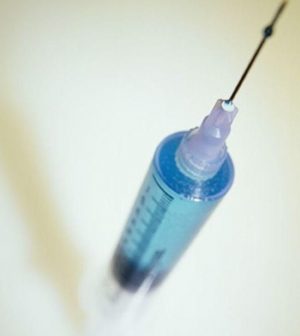- Recognizing the Signs of Hypothyroidism
- 10 Strategies to Overcome Insomnia
- Could Artificial Sweeteners Be Aging the Brain Faster?
- Techniques for Soothing Your Nervous System
- Does the Water in Your House Smell Funny? Here’s Why
- Can a Daily Dose of Apple Cider Vinegar Actually Aid Weight Loss?
- 6 Health Beverages That Can Actually Spike Your Blood Sugar
- Treatment Options for Social Anxiety Disorder
- Understanding the Connection Between Anxiety and Depression
- How Daily Prunes Can Influence Cholesterol and Inflammation
Common Immune Drug Methotrexate May Hamper Response to COVID-19 Vaccine

A widely used medicine for autoimmune diseases may lower people’s immune response to the Pfizer mRNA COVID-19 vaccine, a new study suggests.
The drug, called methotrexate, is often given to patients with immune-mediated inflammatory conditions such as rheumatoid arthritis and psoriasis/psoriatic arthritis.
“Our findings suggest that different strategies may need to be explored in patients with immune-mediated inflammatory diseases taking methotrexate to increase the chances of immunization efficacy,” said a team led by Dr. Jose Scher of New York University Langone Health in New York City.
In this study, the researchers assessed the immune response to the mRNA Pfizer COVID-19 vaccine in 82 patients with immune-mediated inflammatory diseases. All of the patients were taking either methotrexate or an alternative “immunomodulator” drug (mainly drugs called TNF inhibitors and other biologics). For comparison, Scher’s team also looked at vaccine responses in a group of healthy people.
The vaccine triggered “adequate” antibody levels in up to one-third fewer of the patients taking methotrexate, compared with patients on other immunomodulatory drugs or in healthy people, the findings showed.
Adequate antibody levels were seen in more than 90% of the 208 healthy participants and the 37 patients on biologic or non-methotrexate oral treatments, but in only 62% of the 45 patients taking methotrexate, the study found.
The researchers also reported that the vaccine induced activated CD8+ T cell responses in healthy people and patients with immune-mediated inflammatory diseases not on methotrexate, but not in patients on methotrexate. T cells are another part of the body’s immune defense system.
The study has been accepted for publication in the journal Annals of the Rheumatic Diseases.
Scher stressed that this was an observational study and can’t prove that methotrexate use actually caused the dip in COVID-19 vaccine effectiveness. It also had a small sample size, only assessed one type of mRNA COVID-19 vaccine (the Moderna mRNA vaccine was not tested), and could have included patients with previously asymptomatic COVID-19 infections.
The researchers also noted that patients on methotrexate were generally older than the comparison group (average age 63 versus 49), and that may potentially explain some of the differences in immune response.
Dr. Diane Horowitz is a rheumatologist at Northwell Health in Manhasset, N.Y. She wasn’t involved in the new study, but said its findings are no reason for people who take methotrexate to give up on COVID-19 vaccines.
“For the majority of patients on methotrexate or other immunosuppressive medications, the COVID vaccine is strongly recommended,” Horowitz said. “These patients should contact their physician to determine the optimal timing of the vaccination.”
According to Horowitz, “the American College of Rheumatology recommends that, for patients who are taking methotrexate, that they skip the dose of methotrexate for one week after each mRNA-based COVID vaccination,” to help maximize their immune response to the shot.
Scher’s team agreed, saying that further study is needed “to determine whether additional doses of vaccine, dose modification of methotrexate, or even temporary discontinuation of this drug can boost immune response.”
More information
The U.S. Centers for Disease Control and Prevention has more on mRNA COVID-19 vaccines.
SOURCES: Diane Horowitz, MD, division of rheumatology, Northwell Health, Manhasset, N.Y.; Annals of the Rheumatic Diseases, news release, May 25, 2021
Source: HealthDay
Copyright © 2026 HealthDay. All rights reserved.










